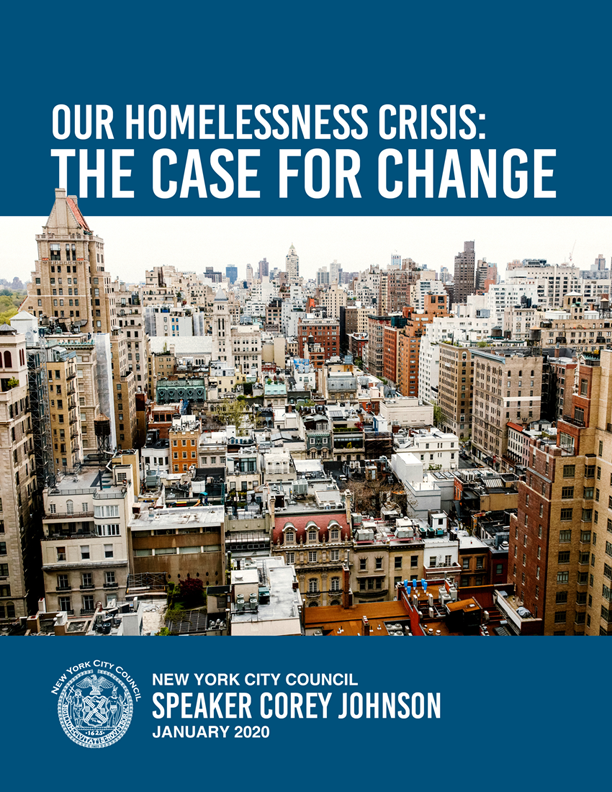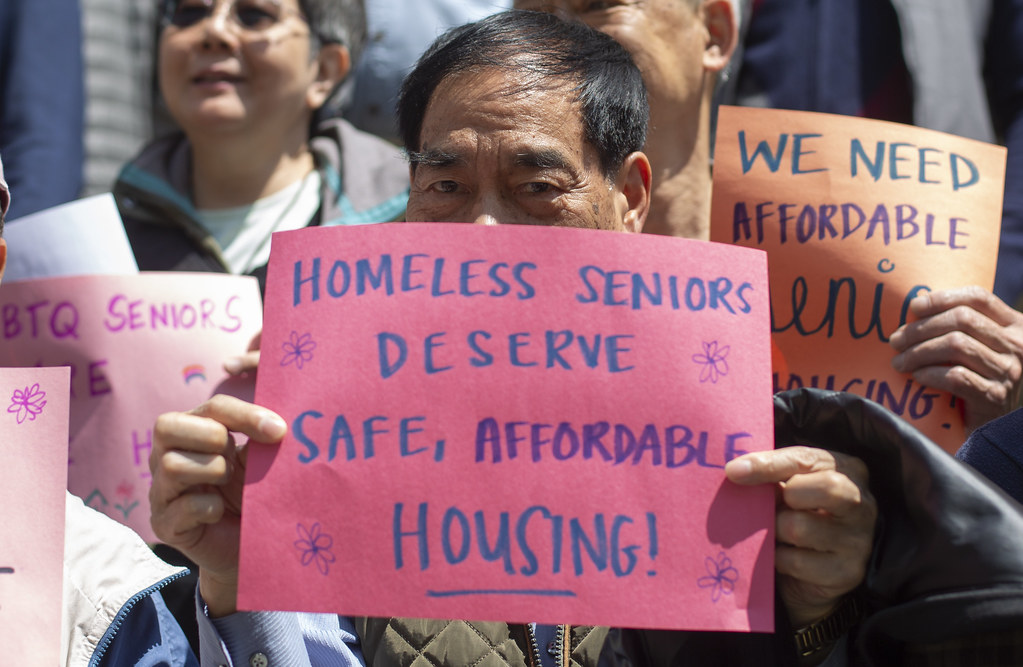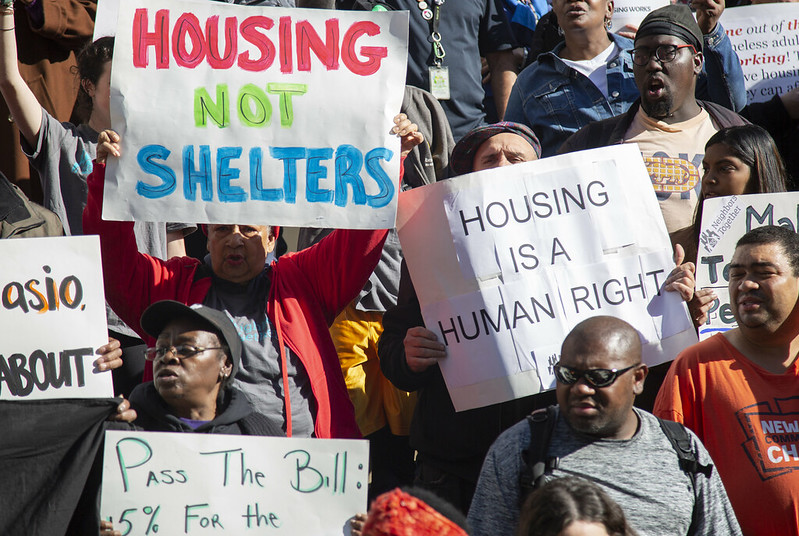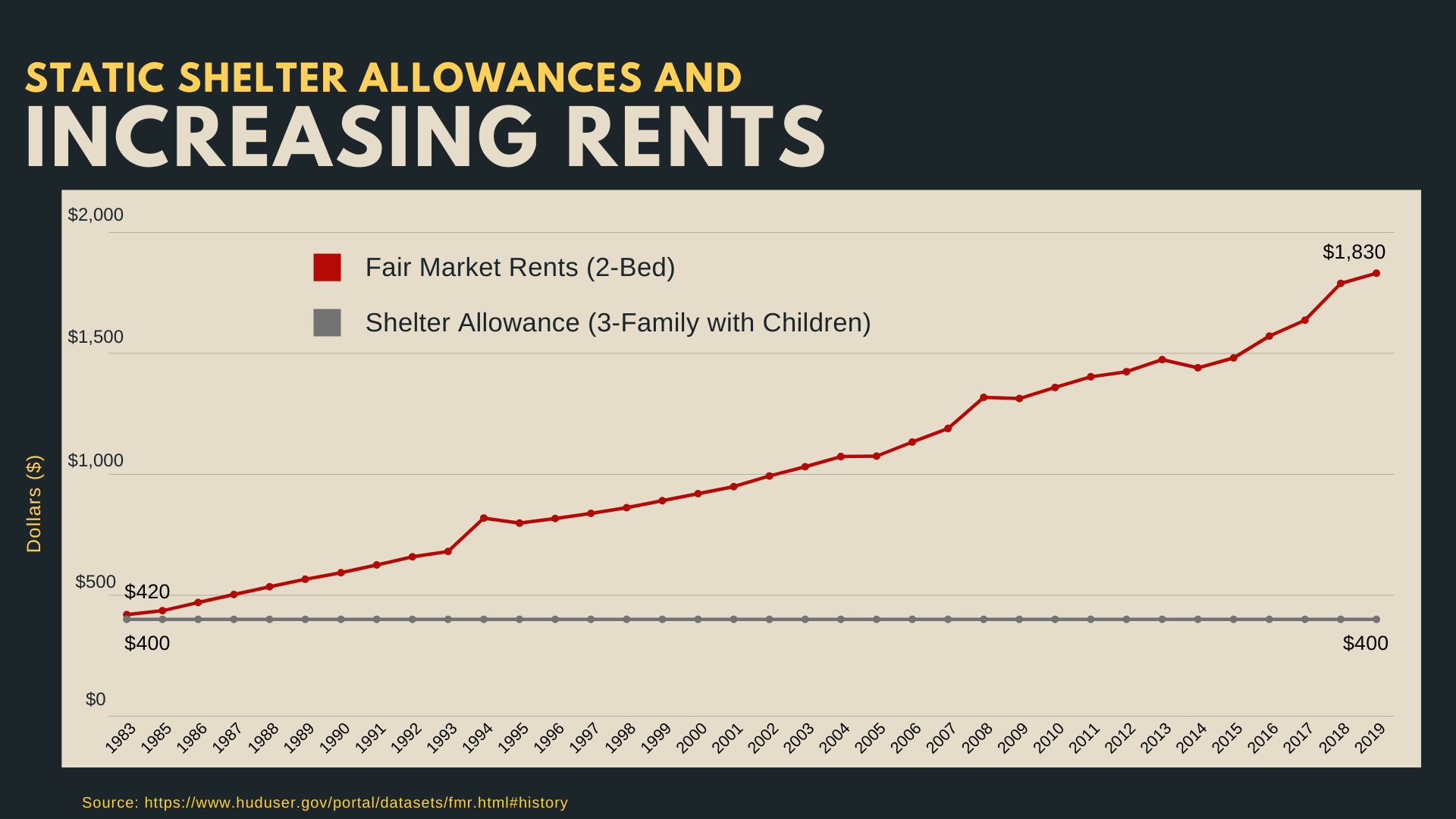The State of Homelessness in NYC
Dear New Yorkers,
Homelessness is a national problem that has reached a crisis level in New York City. If you live here, you encounter this reality every day. On the subway, on the street, at school, and at work, we interact with colleagues, friends, and neighbors who are experiencing, or are at risk of, homelessness. Everyone wants a safe home where they can rest their head at night, and everyone wants to experience the enormous possibilities of living in the greatest city in the world. But, for approximately 80,000 of our fellow New Yorkers, realizing those possibilities is complicated by the experience of homelessness.
We can no longer simply accept this reality. It requires urgent action. Unfortunately, our federal and state governments have failed to fulfill the roles they should play in alleviating poverty. While we must continue to raise our voices and advocate that they meet their responsibilities to all of us, we, as a City, must act.
We need to take immediate steps to provide appropriate services and supports that enable people to exit homeless shelters more quickly and easily, or avoid them in the first place. We need to equip all street outreach teams with the tools and flexibility to bring unsheltered individuals inside. We also need a long-term vision that shifts resources to permanent, affordable housing and reduces the number of people who are homeless.
Over the past year and a half, the City Council has engaged with a multitude of stakeholders and advocates. Their perspectives have been invaluable and have allowed us to develop the set of recommendations contained in this report. We want to thank each person who has shared their insights and experience with us. The development of this paper has been a team effort, and it is that kind of collaboration that is essential to moving this work forward.
Sincerely,
Corey Johnson
Speaker
Stephen Levin
Chair, General Welfare Committee
Summary of Recommendations
This policy paper seeks to recalibrate the City’s approach to addressing homelessness by focusing on six key strategies:
Prioritize permanent housing and avoid entrance into shelter
Prioritize permanent housing and shelter exits
Enhance supports for individuals and families in the shelter systems
Foster a cohesive approach to housing and homelessness policy
Match services to affordable housing needs and improve data-based evaluation
Read all the Recommendations in Our Homelessness Crisis: The Case for Change.
Prevention
Prevention focuses on concrete steps the City and State can take to provide supports for individuals and families who are at risk of homelessness, so that they can avoid the shelter system altogether and remain in permanent, affordable housing.
Key Recommendations
Recommendations prioritize permanent housing and avoid entrance into shelter by calling for the following actions:
- Supplementing the Shelter Allowance
- Expanding Access to City Rental Assistance Vouchers
- Expanding Prevention Services
- Improving State Discharge Planning for Those Exiting Prison
- Expanding NYCHA Housing Options for Those with Criminal Justice System Involvement
- Supporting At-Risk Seniors
- Improving Outreach, Information, and Enforcement
- Addressing Conditions in Three-Quarter Houses
Increase Pathways to Permanent Housing
Increase Pathways to Permanent, Affordable Housing focuses on concrete steps the City and State can take to create opportunities for individuals and families who are homeless to move out of City shelters and into permanent, affordable housing.
Permanent Housing Placements vs Shelter Counts
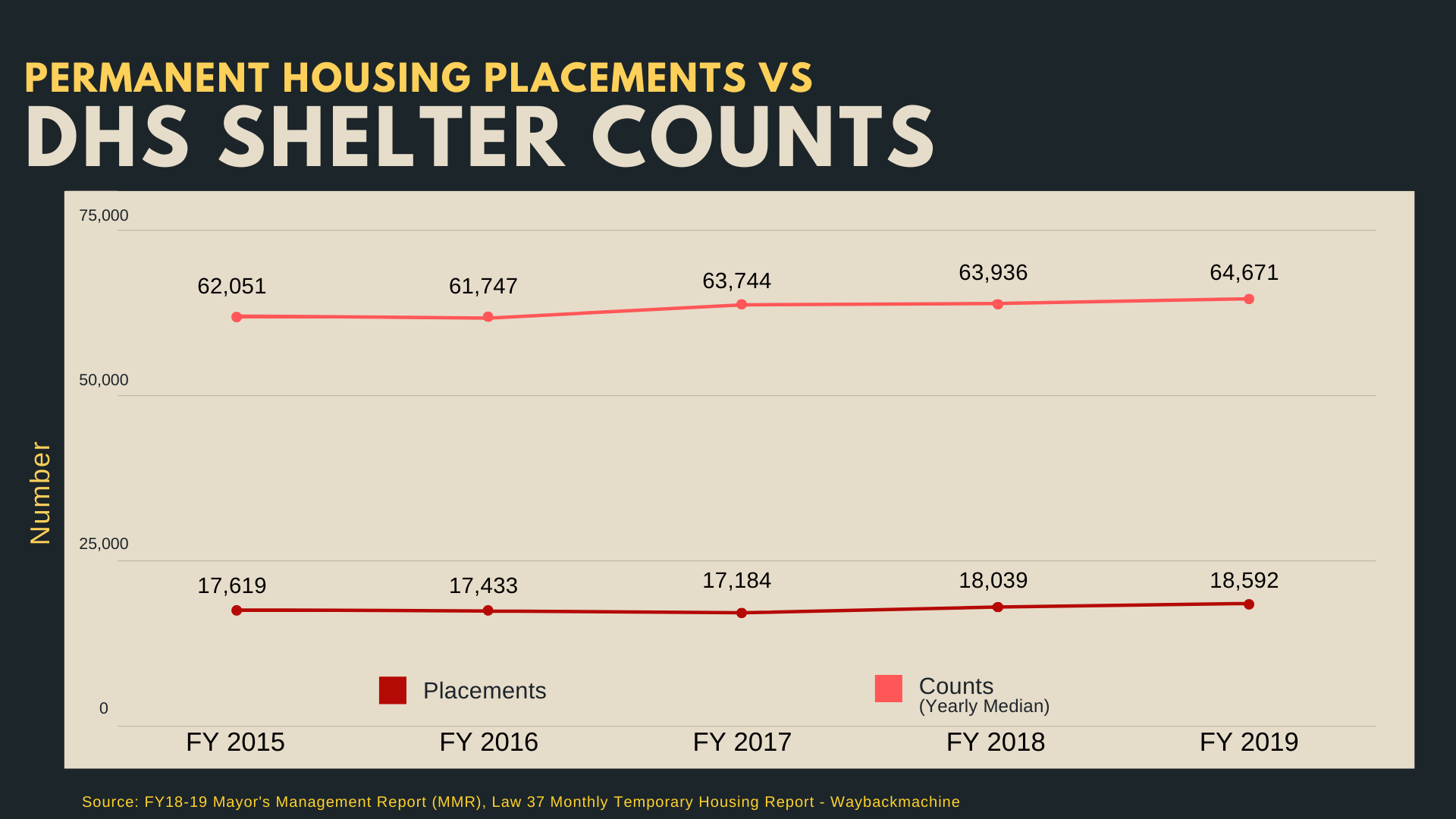
Data Source
FY18-19 Mayor’s Management Report (MMR) & Law 37 Monthly Temporary Housing Report
Key Recommendations
Recommendations prioritize permanent housing and shelter exits by calling for the following actions:
- Increasing the City Rental Assistance Voucher Amount to Fair Market Rate
- Increasing Access to More Deeply Affordable Housing
- Aggressively Building Supportive Housing
- Ensuring a Strong Existing Supportive Housing Portfolio
- Expanding Housing Options for Homeless Youth
- Expanding Eligibility for Rental Assistance Vouchers
- Addressing Source of Income Discrimination and Engaging Landlords
- Expanding Aftercare Services
- Increasing the Number of Housing Specialists
Support Our Unsheltered Neighbors
Support Our Unsheltered Neighbors focuses on concrete steps the City and State can take to improve the process of transitioning individuals from the streets and hospitals to permanent, affordable housing.
Key Recommendations
Recommendations aim to reduce street and medical homelessness by calling for the following actions:
- Expanding Safe Havens and Other Alternatives to Shelter
- Equipping Street Outreach Teams with the Necessary Tools to Bring People Off the Streets
- Utilizing an “All Hands-on Deck Approach”
- Creating a Robust Medical Respite Program
Street Homelessness 2014-2019
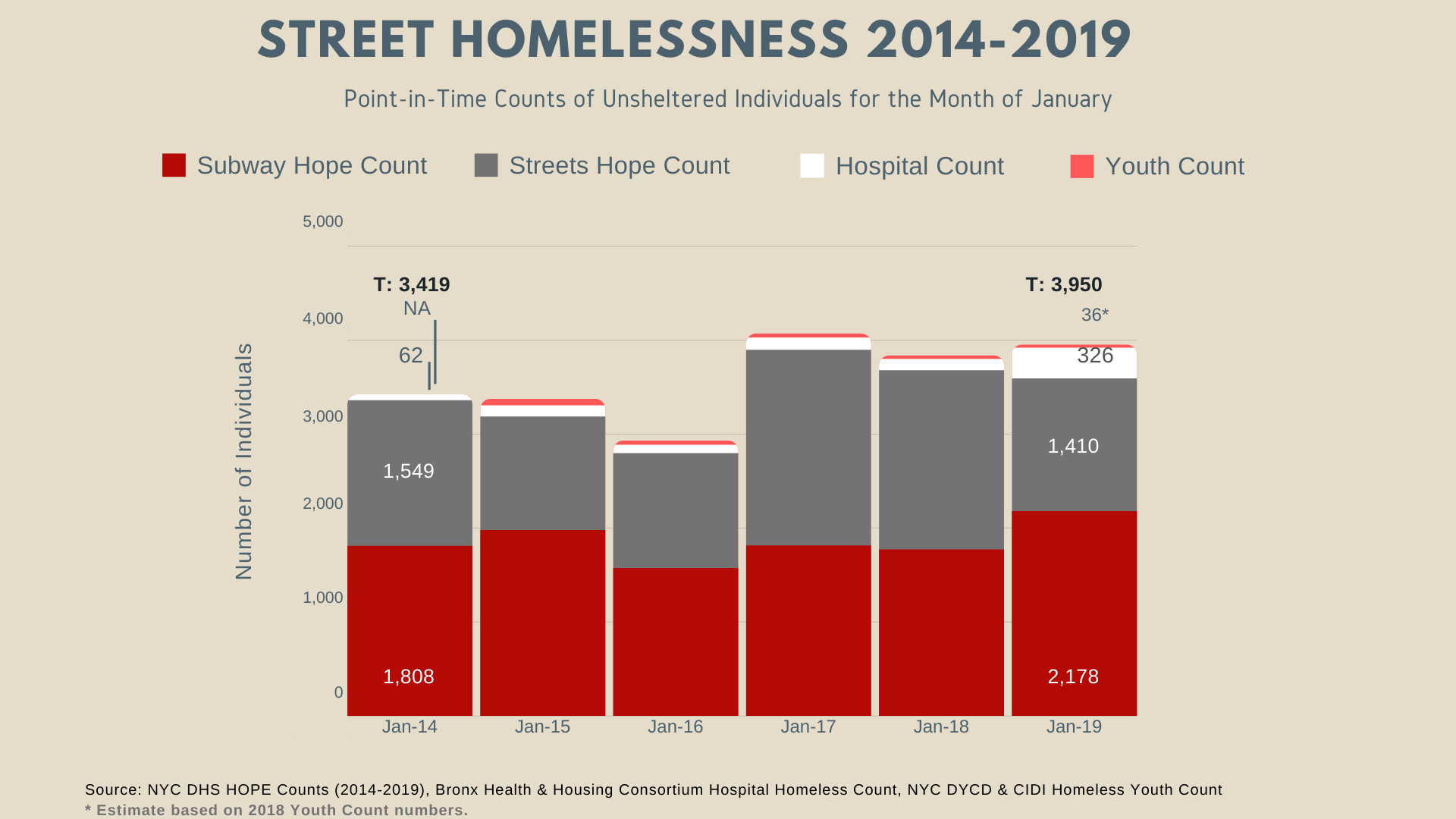
Support Our Sheltered Neighbors
Support Our Sheltered Neighbors focuses on concrete steps the City and State can take to improve the City’s shelter system and the services provided to those experiencing homelessness, to help them stabilize; secure permanent, affordable housing; and, ultimately, exit shelter.
Monthly Average DHS Shelter Entries, by Community District
Data Sources
Homeless Shelter Entries
Homeless Shelters
Key Recommendations
Recommendations enhance supports for individuals and families in the shelter systems by calling for the following actions:
- Increasing Supports for Survivors of Domestic Violence in the DHS and HRA Systems
- Increasing Economic Empowerment Services for People in City Shelters
- Increasing Supports for Formerly Incarcerated Individuals
- Increasing Supports for Runaway and Homeless Youth
Integrate Housing and Homelessness Policy
Key Recommendation
Recommendations foster a cohesive approach to housing and homelessness policy by calling for the following action:
- Streamline Coordination Within City Government

Long-Term Vision
Long-Term Vision focuses on concrete steps the City can take to shift funding priorities and achieve improved outcomes over the long-term for individuals and families who are homeless or at risk of homelessness.
Key Recommendations
Recommendations shift resources to prioritize permanent, affordable housing, match services to needs, and improve data collection and evaluation by calling for the following actions:
- Work Toward a Long-Term Vision that Prioritizes Permanent, Affordable Housing as the Shelter Census is Reduced
- Work Toward a Long-Term Vision that Matches Resources to Needs, Rather Than Systems
- Work Toward a Long-Term Vision that Uses Improved Data Collection and Robust Evaluation to Achieve Better Outcomes
HUD Fair Market Rents
MMR (Mayor’s Management Report)
Law 37 Monthly Temporary Housing Report
- HRA (Human Resources Administration)
- DHS (Department of Homeless Services)
- HPD (NYC Housing Preservation & Development)
- DYCD (Department of Youth and Community Development)
NYC DHS Hope Counts (2014-2019)
Bronx Health & Housing Consortium Hospital Homeless Count
NYC DYCD & CIDI Homeless Youth Count
HUD Homeless Population
- HUD 2019 Continuum of Care Homeless Assistance Programs Homeless Populations and Subpopulations
- CoC Homeless Populations and Subpopulations Reports
Homeless Shelters Entries and Locations
For feedback, comments, and questions please email DataInfo@council.nyc.gov.
Created by the NYC Council Data Team.

